Revolutionising Ethiopian agriculture
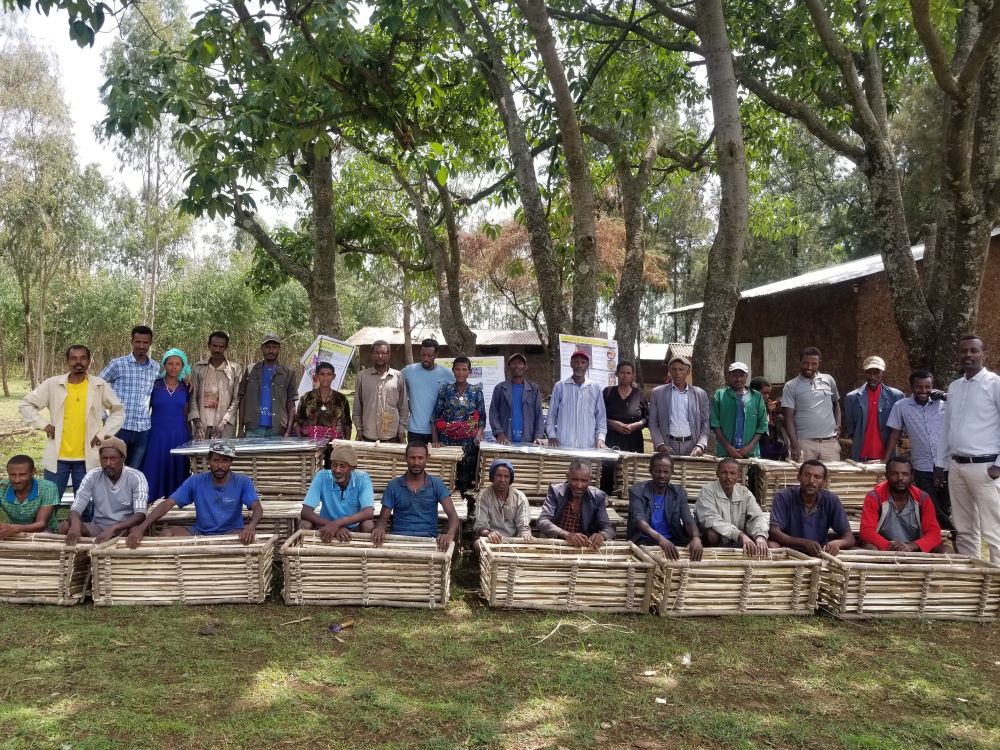
Beekeeping trainees attend a workshop on making top-bar hives from local materials. Credit - Bees for Development Ethiopia.
More bees, more food: Revolutionising Ethiopian agriculture for a sustainable future
Ethiopia relies on subsistence agriculture to feed its population of over 120 million people, and agricultural intensification is a key pillar of the country's national development plans to ensure food security. Irrigation agriculture is practiced to increase yields and length of crop seasons, but growing like this can encourage pest and disease outbreaks. Currently the only solution farmers are aware of are chemical pesticides, which are harmful for pollinators, soil organisms, water bodies, and people. The Intergovernmental Science-Policy Platform on Biodiversity and Ecosystem Services (IPBES) Assessment Report on Pollinators, Pollination and Food Production outlines both the importance of insect pollinators for food security, and the threats of chemical pesticides to their population numbers and diversity. Bees for Development Ethiopia has been working with beekeepers in the Amhara region, who alerted our team to the impacts of pesticides on their honeybee colonies. Fewer honeybees producing valuable products and pollinating crops, means knock-on impacts for farmers and beekeepers' livelihoods.
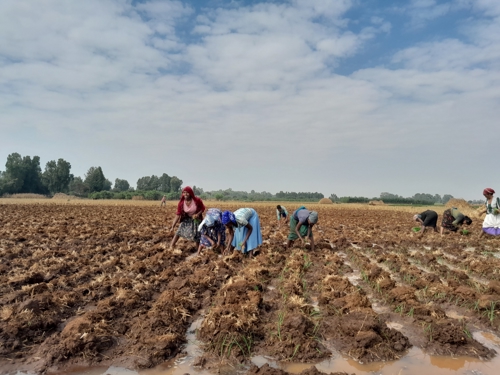
Our project, ‘More Bees: Supporting agrobiodiversity and livelihoods in Amhara, Ethiopia,’ was launched in June 2022, with funding from the Darwin Initiative. The aims are to encourage alternative pest-management practices, protect pollinators, and promote nature-friendly beekeeping to diversify income streams for smallholders. More Bees is a collaboration between Bees for Development UK, Bees for Development Ethiopia, Pesticide Action Network (PAN) UK, Pesticide Action Nexus (PAN) Ethiopia, and Bahir Dar University. The project is training farmers, agricultural and beekeeping extension agents, entomologists, and staff from partner organisations in agroecological farming methods to reduce the use of chemical pesticides on crops, alongside Nature-based Beekeeping to offer alternative income streams and boost crop pollination and yields.
The project launched in two Woredas (districts) of Amhara – Fogera and North Mecha – and has reached 267 trainees. A range of activities and training events have been carried out with the aim of increasing stakeholder knowledge and awareness of the impacts of pesticides and alternative pest management options, and equipping smallholders with the skills and knowledge to keep bees as an additional source of income. Farmers and extension agents received training from UK entomologist Mike Edwards in identifying different types of pollinators and surveying crops for pests and natural enemies.
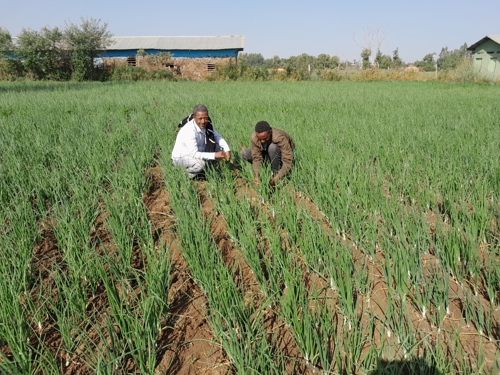
Integrated Pest Management (IPM) training has been carried out through weekly Farmer Field Schools, allowing agricultural experts, development agents, and farmers to learn about agroecological farming techniques, soil and crop health, and the role of natural enemies in controlling pests. Agroecological methods optimise the interactions between plants, animals, humans, and their environment to produce sustainable, just, and regenerative farming systems. Farmers on the More Bees project are running trial plots of onion, pepper, and grass pea to compare the impacts of traditional methods of chemical pesticide application versus IPM. Farmers are trialling using natural pest repellents such as Neem extract and encouraging natural enemies of pests by using food spray and sowing border crops. The IPM methods being tested have been transferred from other sites in Ethiopia where PAN Ethiopia have in-depth experience. Reduced and targeted chemical application will protect pollinators such as honeybees and preserve the biodiversity of farmland ecosystems. Diverse, healthy insect populations are vital to produce high-quality, abundant crops for local communities; IPBES has cited IPM methods, farmer education, and pesticide reduction as crucial in achieving this goal.
A More Bees project participant said, “We used to think that no insects, apart from honeybees, had any benefit. Now we understand the importance of maintaining habitat to support natural enemies. We are doing pest observations. We count insect numbers and work out the ratio between natural enemies and pests so we can make informed decisions about spraying.”
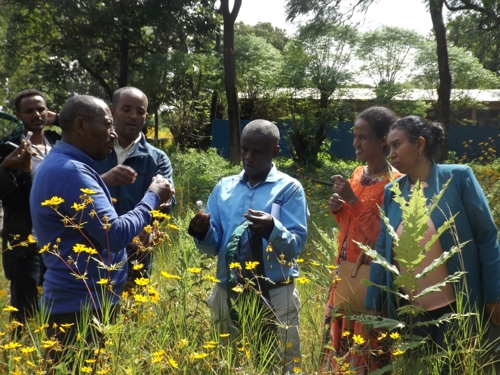
The IPM trial plots produce data on pest numbers, natural enemies, crop yields, and net income and compare these with traditional ‘farmer plots’ managed only with chemicals. Results obtained between November 2022 and April 2023 indicate that IPM plots contain larger numbers of natural enemies and lower numbers of pests on average when compared to traditional farmer plots. In Fogera, IPM plots achieved higher net incomes per 0.25 hectares than conventionally managed farmer plots – despite in some cases achieving lower sale prices. These results are promising and indicate that farmers in this region can achieve equal, if not greater, income from farming using IPM methods – not to mention the potential for keeping bees as an additional income stream.
Grass pea (Lathyrus sativa) is an interesting crop. Compared to onion and pepper it has lower value but is grown by many more farmers. It is known as the ‘bee killing crop’ by some beekeepers because it is heavily sprayed with chemical pesticides profenofos and chlorpyrifos, and yet its nectar is highly attractive to honeybees – more so because it flowers at a time when there is little other forage. Beekeepers often report that their colonies dwindle when grass pea is flowering for this reason. Our baseline survey revealed that, on average, farmers spray their grass pea crop seven times in a season.
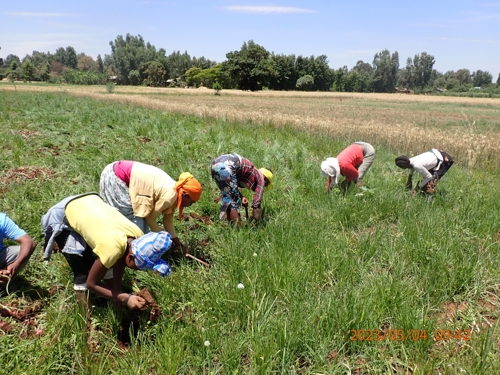
Workshops on pesticide impacts and policies have been successful in informing government extension agents and agricultural experts on the impacts of pesticides on pollinators, and the policies in place to mitigate them. Smallholder farmers and beekeepers received training on Nature-based Beekeeping and colony management to protect honeybees from pesticides and increase the forage available to them. Seventy-eight beekeepers whose colonies were destroyed or severely depleted by chemical pesticides were provided this training to help them keep bees again. The More Bees project aims to benefit men and women equally; we facilitated gender analysis workshops to highlight the different roles played by men and women in farming and to break down stereotypes and biases held by groups of opposite genders.
One beekeeping trainee said, “This is the first beekeeping training we took. We now understand the link between crop protection and beekeeping. This kind of integrated thinking is not common and yet so important.”
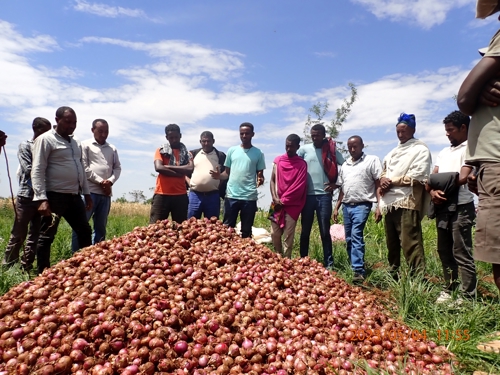
The impacts of the project’s activities and training are evaluated by comparing data from a baseline survey of farmers, beekeepers, and extension agents to annual surveys of project participants. In April 2023, the annual survey revealed that 78% fewer participants cited chemical pesticides alone as the only methods of controlling pests and 90% of participants now understand that other pollinators apart from honeybees are beneficial to them and their farms. Just one year into the project, these results are promising and signal a shift in attitudes which can have significant impacts for smallholders and the valuable ecosystems they manage – not to mention the bees.
We are just now entering the second round of IPM trials, and this will involve the set-up of eight more Farmer Field Schools. In the coming year we aim to shift farmers’ understanding further about the relationships between insects, insect predators, plants, flowers, and pollinators towards securing a sustainable food system underpinned by a species-rich ecosystem.
Written by Janet Lowore, Jenny Handley, and Imogen Astley Jones. For more information on this Darwin Initiative Main project 29-021, led by Bees for Development, please click here.

 Back
Back